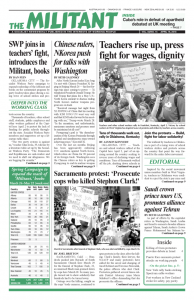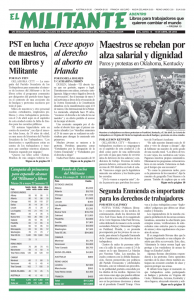The walkout by teachers in Oklahoma is part of a rising wave of school workers strikes and protests across the country that point the way forward for the entire labor movement.
Inspired by the social movement union members built in West Virginia, teachers in Oklahoma were confident to reject the state’s pay raise and small increase in funding as insufficient and walk out. When Kentucky’s legislature slashed teachers’ pensions last week, they didn’t hesitate to walk out and march on the Capitol. Thousands of teachers in Arizona rallied March 28 and plan to step up their protests if the state doesn’t meet their demand for a pay raise.
Get in your car, book a flight, get on a bus — make your way to these fights. Join the picket lines and rallies teachers and their allies are organizing in Oklahoma and elsewhere. Stand with them. And use what you learn to get your union and co-workers to send messages of solidarity and contribute to their strike funds.
Solidarity is needed. Like the bosses in mines, mills and factories, state government officials are determined to make working people pay for the economic, political and moral crisis of their capitalist system, and are going after workers’ pay, pensions, health care and dignity.
Workers solidarity is even more important for teachers and other public workers. They confront the capitalist rulers only indirectly. Whether their bosses are a school board or state government, they aren’t capitalists themselves, but government bodies that represent the class interests of the bosses.
Autoworkers, coal miners and other private-employed workers can use their collective power on the shop floor and the picket line to fight boss attacks, and can strike and shut production, cutting off the bosses’ profits.
Members of the Socialist Workers Party are organizing to get to these battles, and seek to bring co-workers, others we work with and youth to go with us. Join us! Contact the party branch nearest you listed in the directory.
We’ll use the Militant and books by SWP leaders to deepen the discussions we have with strikers and others about the class divide between workers on one side and bosses and their government on the other. We explain that everything that breaks down the divisions they try to push on us — employed vs. unemployed, native-born vs. immigrant, men vs. women, Black vs. Caucasian — is in our interest. On this road we can chart a course to independent working-class political action and the fight to take political power into our own hands.
Let’s get going!

